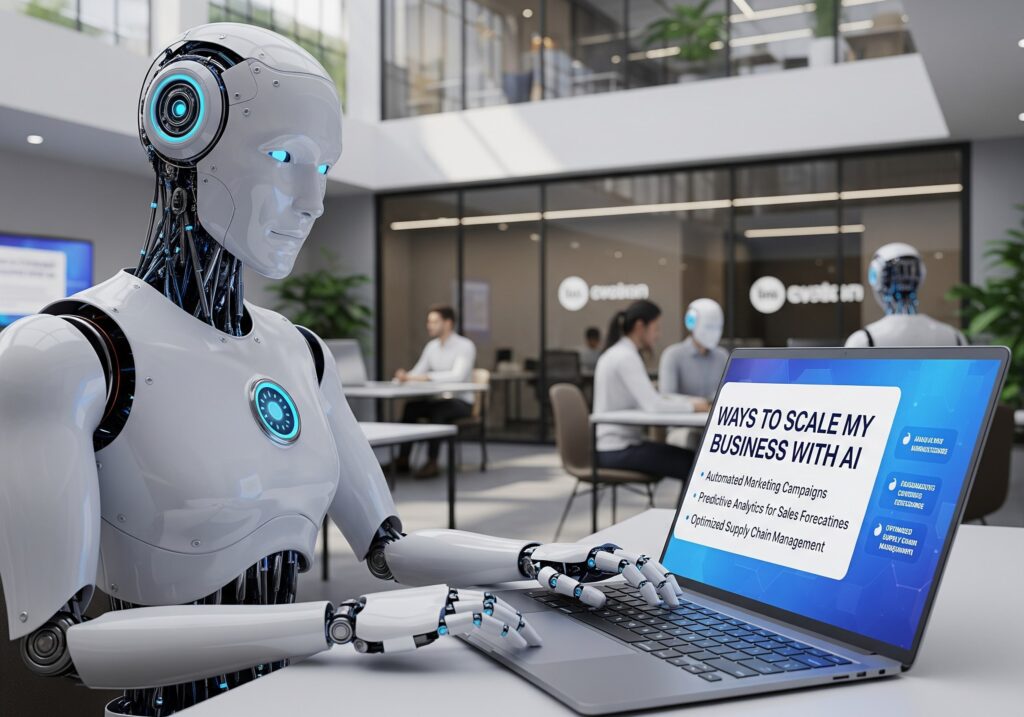
“Ways to scale my business with AI—discover how by using an AI workforce to automate tasks, reduce costs, and boost productivity for sustainable growth.”
The traditional playbook for business growth is well-trodden. You hire more people, open new offices, and invest in bigger infrastructure. This model works, of course, but it’s often slow, expensive, and riddled with bottlenecks. What if there was another way? A path to scaling that didn’t automatically mean a bigger payroll or a sprawling physical footprint? This is the promise of an AI workforce.
Today, we stand at the precipice of a new era. An era where an AI workforce—a collection of intelligent, virtual agents—is not just a futuristic concept. It’s a tangible, accessible reality. These aren’t the clunky chatbots of yesterday. These are sophisticated digital employees. They can handle complex tasks, learn from new data, and operate tirelessly, 24/7. They offer an entirely new framework for business growth. This article will explore how you can use an AI workforce to scale your business with AI. We’ll look at the specific benefits. We’ll also cover practical applications. We’ll show how an AI workforce can reduce costs and boost productivity. Then, we’ll see how it can provide round-the-clock service. Finally, we’ll introduce a robust platform that makes this possible.
An AI Workforce: The Ultimate Scaling Engine
Let’s break down what an AI workforce is. Think of it as a team of specialized digital assistants. You can program them to perform a wide range of tasks. These tasks can be repetitive and mundane. They can also be complex and strategic. One AI agent might handle customer support inquiries. Another could manage your social media content calendar. A third might be an internal expert, training new human employees. The key here is autonomy. These agents can perform tasks on their own. They follow rules and learn from interactions. They free up your human team to focus on higher-value work.
This shift in thinking is critical. Instead of seeing AI as a tool, you start seeing it as a partner. It’s a new kind of team member. This team member doesn’t need a salary, benefits, or a vacation. It can be duplicated a thousand times over at a moment’s notice. This is why an AI workforce is the ultimate scaling engine. It allows you to expand your business without the traditional friction of adding new headcount. This is a game-changer for entrepreneurs and small business owners.
AI Workforce Benefits: The Pillars of Growth
So, what are the concrete benefits of adopting an AI workforce? The advantages are numerous and impactful. They touch every part of a business, from the front office to the back end.
- Reduced Operational Costs: This is often the first benefit people think of. Human employees require salaries, benefits, and a lot of overhead. An AI agent has a deployment cost. After that, the running costs are minimal. You can deploy hundreds or thousands of agents for a fraction of the cost of one human employee. This means you can handle massive work without your budget skyrocketing. Think about a seasonal business. It has huge spikes in demand. It needs more staff during those times. An AI workforce can be scaled up instantly to meet that demand. This avoids the cost and hassle of temporary hiring.
- Improved Efficiency and Productivity: AI agents work at machine speed. They don’t get tired. They don’t make careless mistakes. They can process vast amounts of data in seconds. This leads to a dramatic increase in efficiency. Imagine an AI agent handling all your initial customer service tickets. It can answer common questions instantly. It can also route complex issues to the right human agent. This frees up your human team. They can then focus on solving more difficult problems. The result is a faster, more effective support system. This also applies to internal tasks. An AI agent can automate data entry. It can also manage inventory. It can even generate reports. This saves countless hours for your human staff.
- Round-the-Clock Service: The global economy never sleeps. Your business shouldn’t either. An AI workforce can provide 24/7 service without any extra effort. A customer in Tokyo can get immediate help from an AI agent while your New York office is closed. This improves customer satisfaction. It also opens up new markets. You can serve a global audience effectively. This is a massive advantage over competitors offering only business-hours support.
- Consistent and Personalized Experiences: An AI agent follows its programming perfectly every time, ensuring a consistent brand experience for all customers. Moreover, AI can use data to personalize interactions. It can remember a customer’s past purchases and previous support tickets, allowing it to offer tailored recommendations and solutions. The result is a customer experience that feels both reliable and personal.
- Data-Driven Insights: Every interaction an AI agent has is a data point. It logs every question. It tracks every response. It records every successful resolution. This data is incredibly valuable. It can give you insights into your customers’ most significant pain points. It can also highlight new trends. You can use this information to improve your products and services. You can also optimize your business operations. An AI workforce is a continuous learning engine. It provides constant information to help you make better business decisions.
- Scalability and Flexibility: This is the core benefit. You can easily scale an AI workforce up or down as needed. You can deploy new agents for a marketing campaign. You can also retire them when the campaign is over. This flexibility is impossible with human staff. It allows you to be nimble. It lets you respond quickly to market changes. It gives you an edge over slower, more rigid competitors.
Practical Applications: Scaling Your Business with AI
How can you use an AI workforce? The applications are incredibly diverse. Let’s explore some specific examples and mini case studies. These show how businesses are already using an AI workforce to scale.
Mini Case Study 1: Scaling Customer Service with AI-Powered Chat Agents A small e-commerce brand, TrendTees, struggled to keep up with customer inquiries. They received hundreds of emails daily and saw many DMs on social media. Their two-person customer service team was overwhelmed. It took them days to respond to some messages, which led to frustrated customers and bad reviews.
The solution was to deploy an AI workforce of customer service agents. They used a no-code platform to build a chatbot. This chatbot was trained on their product knowledge base and FAQ section. The agent could answer questions about shipping times, return policies, product sizing, and track order status. The agent was integrated into their website and social media channels.
The results were immediate and impressive. The AI agent handled over 80% of all incoming inquiries, freeing the human team to focus on complex issues, such as damaged products or difficult returns. The average response time dropped from days to seconds, and customer satisfaction scores improved dramatically. TrendTees handled a massive increase in order volume during a viral marketing campaign without hiring a new customer service rep. They were able to scale their business with AI.
Mini Case Study 2: Automating Marketing and Content Delivery A solo entrepreneur, “Sarah,” ran a popular online fitness course. She had a lot of content. New students were enrolling all the time, and she found herself spending hours answering the same questions. Students wanted to know about workout schedules, meal plans, and the course curriculum. This took up all her time and prevented her from creating new content.
Sarah built an AI agent to handle all the administrative and informational tasks. This agent was trained on her entire course curriculum. It knew every detail of every module. It also had all the information about her recommended meal plans. This AI agent was integrated into her student portal. Students could ask any questions they had. They would get an instant, accurate answer.
This allowed Sarah to scale her business without adding a virtual assistant. She could dedicate all her time to creating new courses and focus on live coaching sessions. Her students felt more supported, as they had a knowledgeable guide available 24/7. Her business grew, and she was able to add new course offerings. All this was made possible by her AI workforce.
Mini Case Study 3: Internal Training and Knowledge Management. A growing tech startup, InnovateTech, hires new engineers weekly. Onboarding was a considerable challenge. The senior engineers spent countless hours training the new hires, teaching them about the company’s internal tools and processes. This took away their core development work and slowed the company’s progress.
InnovateTech built an AI knowledge agent. This agent was trained on all the company’s internal documentation. It knew the code base, was familiar with the project management tools, and understood the company’s HR policies. New hires could ask the AI agent any questions they had. They could ask how to set up their development environment or inquire about the company’s sick leave policy. The agent provided instant answers.
This significantly reduced the time spent on onboarding. New employees became productive much faster, and the senior engineers could return to their essential work. This is a powerful example of using an AI workforce for internal scaling. It shows how AI can boost productivity with AI tools, and it can do this even within your organization.
Mini Case Study 4: E-commerce Product Recommendations An online bookshop wanted to improve its sales. It had a vast catalog, but many customers left without buying anything. The shop realized that customers needed better guidance, help finding the right book, and personalizing the shopping experience.
They built an AI agent. This agent was designed to be a personal shopping assistant. It asked customers about their reading preferences, favorite genres and authors, and past purchases. Then, it used this information to make personalized recommendations. The agent could also answer questions about specific books, tell a customer if a book was a hardcover or a paperback, and provide a summary.
This AI-powered assistant had a significant impact on sales. It increased the average order value. It also kept customers on the site longer. It created a more engaging shopping experience. The business could scale its sales without hiring a team of human shopping assistants. They simultaneously provided a highly personalized service to thousands of customers. This is an excellent example of scaling your business with AI.
The Rise of No-Code AI Platforms
These mini case studies sound great. Building an AI workforce is too technical or expensive. This is where no-code AI platforms come in. These platforms make building and deploying AI agents accessible to everyone. You don’t need to be a data scientist. You don’t need to know how to code.
Think of it like building a website with a drag-and-drop tool. You provide the information, define the rules, and customize the agent’s persona. The platform does all the heavy lifting, handles the complex AI models, and manages the infrastructure. This democratization of AI technology is what’s driving the current revolution. It allows small businesses and entrepreneurs to compete with larger companies and scale their businesses with AI.
These platforms often come with a marketplace. You can find pre-built AI agents for everyday tasks. You can find agents for customer support. You can also find them for content creation. You can even find them for internal HR. This makes it even easier to get started. You can simply customize an existing agent. You can then deploy it to your business. This dramatically reduces the time and cost of adoption.
The Future is Now: Your AI Workforce Awaits
The world is changing. New, more powerful methods are replacing the old ways of scaling. An AI workforce is no longer a futuristic dream. It’s a present-day reality. It offers a clear path to scaling your business with AI. This path is more efficient, cost-effective, and flexible than ever. You can reduce operational costs. You can also boost productivity. You can provide 24/7 service. You can do all this without the limitations of a human-only workforce.
The opportunity is real. It’s time to start thinking about your AI workforce. What tasks in your business are repetitive? What tasks are taking up too much of your time? These are the perfect candidates for AI automation. You can start small. You can build one AI agent to handle one specific task. Then, you can expand from there. This is a journey of digital transformation with AI. It’s a journey that can redefine your business’s potential.
This is where a platform like ScaleWise AI comes in. ScaleWise AI is a powerful, no-code platform and marketplace. It is designed to build and deploy AI agents. It is perfect for businesses, creators, and educators. ScaleWise AI lets you create a custom AI agent. You can train it on your data. You can then deploy it to your website, social media, or internal systems. You can also browse a marketplace of pre-built agents. This gives you a fast track to AI adoption. With ScaleWise AI, you can start building your AI workforce today. You can begin to scale smarter, not just harder.
The possibilities are endless. You can have a team of AI agents handling your customer support. You can have another team creating content for your blog. You can have an internal AI agent train your new hires. The key is to start thinking differently. Start seeing AI as a partner. Start seeing it as a new kind of team member. Then, you can unlock a new level of growth. You can truly scale your business with AI.
FAQs
What is an AI workforce?
An AI workforce is a collection of virtual, intelligent agents. You can program these agents to perform various business tasks. They can operate autonomously. They can also work alongside your human employees. They are designed to improve efficiency and reduce costs.
How is an AI agent different from a traditional chatbot?
Traditional chatbots follow a rigid script. They have a limited set of responses. An AI agent is much more sophisticated. It uses machine learning to understand complex language. It can also learn from new data. It can also have more natural conversations. It can perform a broader range of tasks beyond simple Q&A.
Is an AI workforce only for large corporations?
No, not. The rise of no-code AI platforms makes an AI workforce accessible to everyone. This includes small businesses, entrepreneurs, and solo creators. These platforms allow you to build and deploy agents without technical expertise. This levels the playing field. It will enable small businesses to compete with much larger companies.
Will an AI workforce replace my human employees?
The goal of an AI workforce is not to replace human employees but to augment them. AI agents handle repetitive, time-consuming tasks, freeing up human employees to focus on more creative, strategic work. It’s about building a partnership between humans and AI, which leads to a more productive and innovative workplace.
What kind of tasks can an AI workforce handle?
An AI workforce can handle a wide variety of tasks. These include customer support and sales. They can also create content and market it. They can also do internal training and knowledge management. They can also do data analysis and reporting. The possibilities are growing every day.
How do I get started with building my own AI workforce?
You can start by identifying repetitive tasks in your business. These tasks are good candidates for automation. Then, you can explore no-code AI platforms like ScaleWise AI. These platforms provide the tools you need to build and deploy your first AI agent. You can start small and then expand your AI workforce over time.
Is it expensive to build an AI workforce?
The cost of an AI workforce has dropped dramatically due to the rise of no-code platforms. These platforms offer subscription-based models, making it affordable for businesses of all sizes. The return on investment is often very high, thanks to the cost savings and increased productivity. It’s an investment that can pay for itself quickly.
How does an AI workforce improve customer service?
An AI workforce can provide 24/7 support. It can handle a large volume of inquiries instantly. It can also give consistent and personalized responses. This leads to faster resolutions and higher customer satisfaction. It also frees up your human support team. They can then focus on more complex and sensitive issues.
Can an AI workforce help with content creation?
Yes, AI agents can be a powerful tool for content creation. They can generate ideas for blog posts and social media updates. They can also draft email newsletters. They can even create product descriptions. This boosts productivity and helps you maintain a consistent content schedule. It also frees up your time for other tasks. This allows you to focus on your core business.
What is the main advantage of using a no-code platform for an AI workforce?
The main advantage is accessibility. No-code platforms remove the technical barrier to entry. Anyone can build a powerful AI agent without hiring expensive developers. This allows small businesses and entrepreneurs to harness the power of AI and scale their businesses with AI, which was previously only available to large tech companies.
How can an AI workforce help me scale my business with AI?
An AI workforce allows you to grow your business without a proportional increase in headcount or costs. You can handle more customers. You can also manage more data. You can expand into new markets. You can do all of this by deploying more AI agents. This scaling model is faster, cheaper, and more flexible than traditional methods. It gives you a competitive advantage. It allows you to grow your business smarter, not just harder.
What is the role of data in an AI workforce?
Data is the fuel for your AI workforce. The more data an AI agent is trained on, the brighter it becomes. It can learn from customer interactions. It can also analyze performance metrics. This data allows the AI to improve its performance over time. It also gives you valuable insights. You can use these insights to make better business decisions.
Can an AI workforce handle multiple languages?
Yes, many AI platforms can create multilingual agents. You can train an agent on different languages. This allows you to serve a global customer base. You can do this without hiring a separate support team for each language. This is a powerful way to expand your business internationally.
How does an AI workforce improve productivity for my team?
An AI workforce takes over repetitive and low-value tasks, allowing your human team to focus on more critical, creative, and strategic work. This can lead to a significant increase in overall team productivity and boost job satisfaction. Your employees will feel more valued and can then focus on work that truly matters.
Is it secure to use an AI workforce with my business data?
Data security is a significant concern. Most reputable AI platforms have strong security measures in place. They use encryption and follow industry best practices. It’s essential to choose a platform with a good reputation. You should also ensure it has clear data security policies. You must make sure your data is safe and secure.
Can an AI workforce help with sales and lead generation?
Yes, AI agents can act as virtual sales assistants. They can qualify leads on your website. They can also answer initial product questions. They can even schedule demos for your human sales team. This helps your sales team. They can then focus on closing deals. This increases your sales pipeline. It also improves your conversion rates.
What’s the difference between AI automation and a simple script?
A simple script follows a fixed set of instructions and cannot adapt to new situations. AI automation uses machine learning. It can understand context, make decisions, learn from new data, and improve its performance over time. It is a much more intelligent and flexible solution.
How can an AI workforce help with internal communication?
An internal AI agent can be an excellent resource for your employees. It can answer questions about company policies. It can also provide information about upcoming events. It can even help with IT support. This improves internal communication. It also reduces the workload on your HR and IT departments.
Can I customize the personality of my AI agents?
Yes, many platforms allow you to customize the persona of your AI agents. You can choose a friendly and helpful tone. You can also go with a more professional and formal style. This ensures the AI agent aligns with your brand’s voice and personality. It creates a consistent brand experience for your customers.
How do I measure the success of my AI workforce?
You can measure the success of your AI workforce in several ways. You can look at metrics like customer satisfaction scores. You can also look at average response times. You can also track the number of tickets AI resolves. You can also measure cost savings and increases in productivity. These metrics will show you the real impact of your AI workforce.





